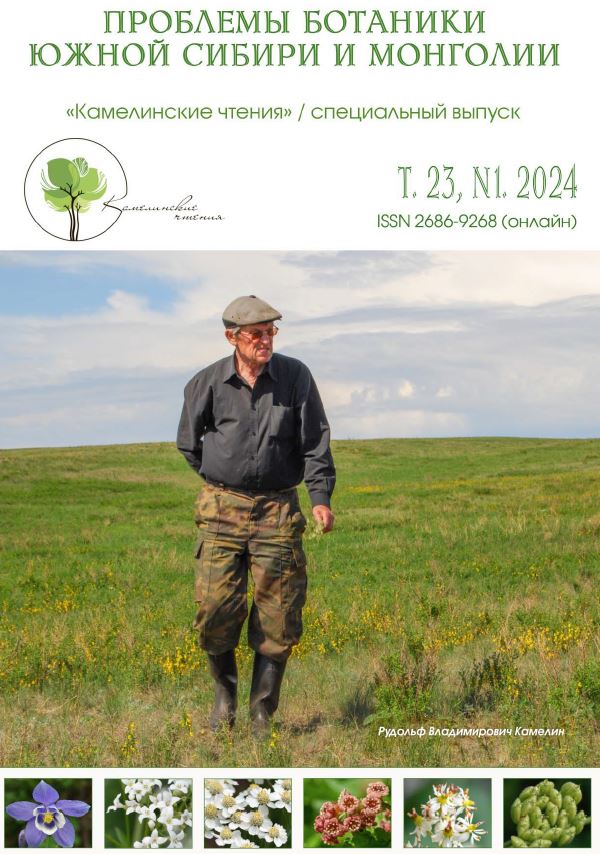Molecular systematics of roburoid oaks (Quercus L. sect. Quercus, Fagaceae) in the Caucasus and adjacent regions: comparison of data on nuclear genome variability with morphological data
УДК 575.174.5+582.632.2
Abstract
Difficulties in studying the taxonomic structure of Caucasian oaks with high morphological diversity and widespread hybridization determine the importance of molecular genetic studies of Quercus species in the region. The interspecific and intraspecific structure of genetic variation was first studied in closely related roburoid oaks of the Crimean-Caucasian region using 18 nuclear microsatellite loci (nSSRs). The seven most common taxa of five species in the region were studied (Q. robur, Q. hartwissiana, Q. pubescens, Q. macranthera and three subspecies of Q. petraea) from different parts of the North Caucasus, Transcaucasia, Crimea and northeastern Europe. 1240 samples from 85 populations were analyzed. Most taxa were first studied using nSSR markers. The effectiveness of microsatellite loci for identification of roburoid oaks in the Crimean-Caucasian region and studying hybridization processes has been demonstrated. Genetic clustering of samples was consistent with taxonomic identification based on morphological characters. The relatedness of the “long-pedunculated” roburoid oaks (Q. robur, Q. hartwissiana) to each other was shown, with a greater difference from other species. For the first time the species status of the limestone oak (Q. petraea ssp. medwediewii) was suggested based on genetic data. At the same time the possible hybrid origin of limestone oak as a result of hybridization of Q. petraea and Q. pubescens is not confirmed. The distribution of taxa in the Crimean-Caucasian region, the proportion of different taxa and their hybrids in populations have been studied. An introgression zone between two subspecies of sessile oak Q. petraea ssp. petraea and Q. petraea ssp. iberica in the Western Caucasus was found. In areas where several species grow together, a certain degree of interspecific hybridization was revealed. However, clear differentiation of species by nuclear markers even in sympatric populations shows the limited introgression of closely related oak species in the Caucasus and Crimea.
Downloads
Metrics
References
Малеев В. П. Обзор дубов Кавказа в систематическом и географическом отношениях и в связи с эволюцией группы Robur // Бот. журн., 1935. - Т. 20, №2 - С. 156-177; - Т. 20, №3. - С. 292-321.
Меницкий Ю. Л. Обзор робуроидных и галлиферных дубов Кавказа // Новости систематики высших растений, 1968. - С. 81-94.
Меницкий Ю. Л. Дубы Кавказа. Обзор кавказских представителей секции Quercus. - Л.: Наука, 1971. - 196 с.
Меницкий Ю. Л. Дубы Азии. - Л.: Наука, 1984. - 315 с.
Меницкий Ю. Л. Семейство Fagaceae // Конспект флоры Кавказа. - СПб.; М.: Тов-во науч. изд. КМК, 2012. -T. 3, ч. 2. - С. 286-292.
Семериков Л. Ф. Популяционная структура древесных растений (на примере видов дуба европейской части СССР и Кавказа). - М.: Наука, 1986. - 140 с.
Семерикова С. А., Алиев Х. У., Семериков Н. В., Семериков В. Л. Филогеография видов дуба на Кавказе по результатам анализа хлоропластной ДНК // Генетика, 2023а. - Т. 59, № 7. - С. 772-788. DOI: 10.31857/ S001667582307010X
Семерикова С. А., Подергина С. М., Ташев А. Н., Семериков В. Л. Филогеография видов дуба в Крыму выявляет плейстоценовые рефугиумы и пути миграций // Экология, 2023б. - Т. 54, № 3. - С. 188-203. DOI: 10.31857/ S0367059723030058
Троицкий Н. Д. Предварительные итоги изучения дубов Крымского государственного заповедника и прилегающего района южного берега Крыма (систематика в связи с условиями произрастания) // Журнал РБО, 1931. -Т. 16, № 4. - С. 313-354.
Guichoux E., Lagache L., Wagner S., Leger P., Petit R. J. Two highly validated multiplexes (12-plex and 8-plex) for species delimitation and parentage analysis in oaks (Quercus spp.) // Mol. Ecol. Resour., 2011. - Vol. 11. - P. 578-585. DOI: 10.1111/j.1755-0998.2011.02983.x
Di Pietro R., Viscosi V., Peruzzi L., Fortini P. A review of the application of the name Quercus dalechampii // Taxon, 2012. - Vol. 61, № 6. - P. 1311-1316. DOI: 10.1002/tax.616012
Kucera P. New name for Central Europaean oak formerly labelled as Quercus dalechampii // Biologia, 2018. - Vol. 73, № 4. - P. 313-317. DOI: 10.2478/s11756-018-0048-z
Kucera P. Quercus banatus grows in Slovenia // Thaiszia - Journal of Botany, 2019. - Vol. 29, № 1. - P. 61-69. DOI: 10.33542/TJB2019-1-04
Kremer A., Hipp A. L. Oaks: an evolutionary success story // New Phytologist, 2020. - Vol. 226, № 4. - P. 987-1011. DOI: 10.1111/nph.16274
Schmidt P. A. Oaks and oak forests in Caucasia // Proceedings Fourth International oak conference (12-15 Sept. 2003, Winchester, England) - The Journal of the International Oak Society, Asheville, North Carolina, USA, 2004. - № 15. -P. 9-29.
Peakall R., Smouse P. E. GenAlEx 6.5: genetic analysis in Excel. Population genetic software for teaching and research-an update // Bioinformatics, 2012. - Vol. 28. - P. 2537-2539. DOI: 10.1093/bioinformatics/bts460
Pritchard J. K., Stephens M., Donnelly P. Inference of population structure using multilocus genotype data // Genetics, 2000. - Vol. 155. - P. 945-959.
Semerikova S. A., Tashev A. N., Semerikov V. L. Genetic diversity and history of pedunculate oak Quercus robur L. in the east of the range // Russian J Ecology, 2023. - Vol. 54, №. 5. - С. 423-438. DOI: 10.1134/S1067413623050089
Vazquez F.M., Garcia D., Marquez F., Vilavi$osa C. M. Annotations to infrageneric nomenclatura of Quercus L. (FAGACEAE) // Fol. Bot. Extremadurensis, 2023. - Vol. 17. - P. 7-64.



